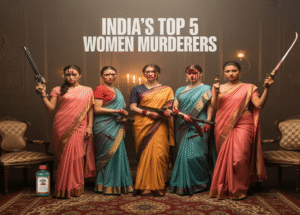
A powerful woman spontaneously caring for her divine friend, receiving eternal support in return. That’s Raksha Bandhan’s origin—until society decided sisters needed saving instead of celebrating. How did gratitude become guilt, empowerment become entanglement? The answer will surprise you.
When Sacred Threads Became Strings Attached
In the incredible buildup to Mahabharat, the battle for righteousness, Krishna’s Sudarshan Chakra completed its divine justice against the tyrant Shishupala. In doing so, a crimson drop fell from Krishna’s fingertip. Time seemed to pause. While queens Rukmini and Satyabhama rushed for elaborate bandages, it was Draupadi who moved with the instinct of pure care and love, tearing a strip from her precious Sari without hesitation, wrapping it tenderly around her beloved sakha’s wound.
Krishna’s eyes filled with profound gratitude. This wasn’t duty or obligation—this was friendship in its most spontaneous form. “Akshyam,” he whispered, blessing her with the unending, promising his presence whenever she needed him. Years later, when Dushasana’s hands reached to dishonor her in a court full of silent spectators, Krishna’s divine intervention made her sari endless—not because she was weak, but because friendship honors friendship, care reciprocates care.
This foundational story reveals a profound question that patriarchal society has conveniently avoided: why must sisters ask for protection or anything else? Isn’t mutual care implied in genuine relationships? Why is vulnerability acceptable only when expressed by sisters, while brothers never seek help, support, or care—not because they don’t need it, but because society has conditioned them to suffer in silence?
The August markets are ablaze with glittering Rakhis, some costlier than daily wages, while e-commerce platforms flash discount codes promising same-day delivery of “protection.” Brothers browse gift catalogs, sisters select threads symbolizing their supposed vulnerability, and society celebrates what it believes is tradition. Yet somewhere between the commercial frenzy and ceremonial pomp, Raksha Bandhan has truly lost its thread, both literally and metaphorically.
Here lies the supreme irony: a society that frames its vilest curses around disrespecting mothers and sisters has systematically allowed sacred bonds to become bonds of bondage. The festival that originally wove threads of gratitude has gotten hopelessly tangled in patriarchal narratives, transforming mutual care into a web of dependency where women remain perpetually ensnared while men are denied the basic human right to seek support.
Society has gradually allowed this sacred thread to become tangled in patriarchal knots by systematically skipping gratitude and weaving in dependency reinforcement instead. The original bonds of mutual respect have been twisted into bonds of protection where “the brother protects his sister while she prays for his prosperity”—a narrative that binds women into vulnerability while elevating men to savior status and simultaneously trapping them in emotional isolation.
The absurdity becomes glaring: tying Rakhi to a 10-year-old brother to “protect” a 26-year-old sister creates a festival where threads of logic have completely unraveled. This serves patriarchal agenda perfectly: each sacred thread becomes a binding cord reinforcing women’s supposed vulnerability while knotting male ego into assigned protector roles, regardless of actual capability, and denying men the emotional freedom to seek care when they need it.
This spiritual entanglement reveals how patriarchy doesn’t destroy empowering narratives, it simply reweaves them into restrictive patterns. Hindu Dharma celebrates goddesses like Durga, Kali, and Saraswati as embodiments of power, yet promotes a festival where women’s threads bind them to helplessness while men are bound to stoic strength. The original Krishna-Draupadi friendship between equals has been rewoven into a template where sacred bonds become binding obligations.
Sociologist Allan G. Johnson illuminates this process: “Societies are patriarchal to the extent that they are male-dominated, male-identified, and male-centered.” Rakhi has been systematically reshaped to align with these values. As Johnson notes in “The Gender Knot”: “With each strand of the patriarchal gender knot that we help to unravel, we join a process of creative resistance to oppression that’s been unfolding for thousands of years.”
The contemporary marketplace reveals theatrical contradictions: women CEOs purchase “protection bands” for kindergarten-aged brothers while society worships powerful goddesses. E-commerce platforms target empowered working women with promotions for dependency symbols, creating markets where economic independence finances symbolic subservience. The symbolism is so inverted it borders on satire, except society isn’t laughing; it’s enthusiastically shopping for its own contradictions.
Contemporary feminist discourse questions these comfortable paradoxes, emphasizing that brothers should “stand up as feminist allies” rather than wielding patriarchal authority. Gender-inclusive celebrations, sisters tying Rakhis to sisters, LGBTQ+ recognition—represent returns to authentic principles of mutual care where everyone can both give and receive support.
Restoring Rakhi’s original emotion of gratitude would fundamentally shift societal consciousness—from viewing women as vulnerable dependents to celebrating them as equal partners in life’s journey, fostering genuine respect that transcends ceremonial gestures and creates lasting gender equality. Consider how different our society might be: perhaps fewer honor killings justified by “protecting family honor,” reduced domestic violence where men feel entitled to control rather than support their sisters and wives, and elimination of moral policing where women’s choices are restricted under the guise of protection. When gratitude replaces paternalism, respect replaces control.
No one is questioning this beautiful festival itself; Raksha Bandhan was and will always remain a celebration worth cherishing. We simply need to restore the basic emotions behind it: the spontaneous care Draupadi showed Krishna, the recognition that love flows best when it flows freely in all directions.
The path forward requires untangling these patriarchal knots: teaching original stories as examples of friendship and reciprocal care; unraveling “protection” language to reweave “presence” and “gratitude”; supporting commerce that celebrates empowerment over entanglement; and reweaving inclusive celebrations welcoming multidirectional care across all identities.
As we navigate this Raksha Bandhan’s commercial circus, we face a choice: are we tying threads of mutual care and friendship, or binding ourselves to hierarchies that entangle us all? In a society where harshest curses invoke disrespecting mothers and sisters, perhaps it’s time to untangle the knots patriarchy has woven and restore the sacred thread of gratitude to this celebration’s heart. The original bonds await restoration—we need only find our way back to the authentic thread that honors both giving and receiving, protecting and being protected, caring and being cared for.


